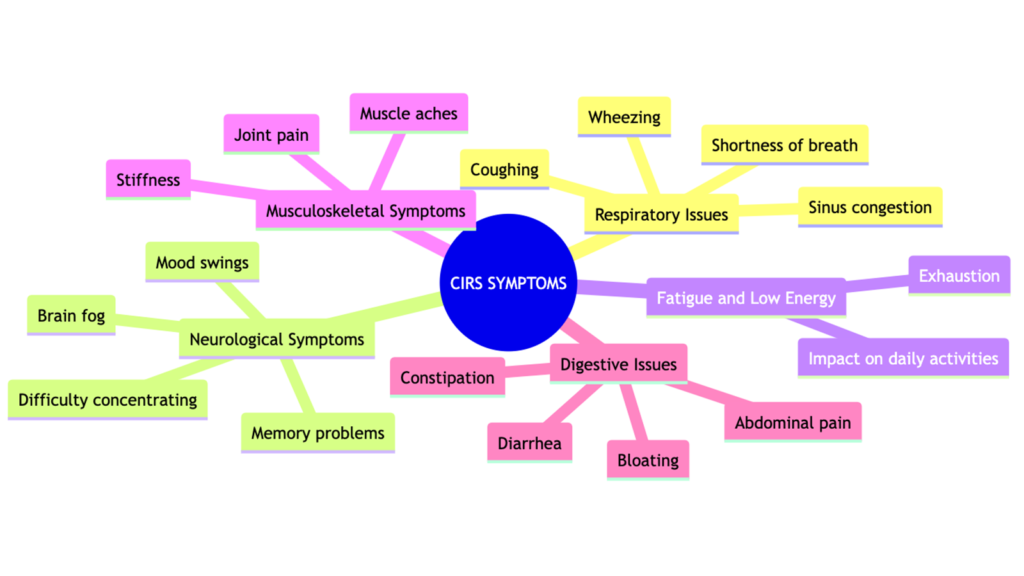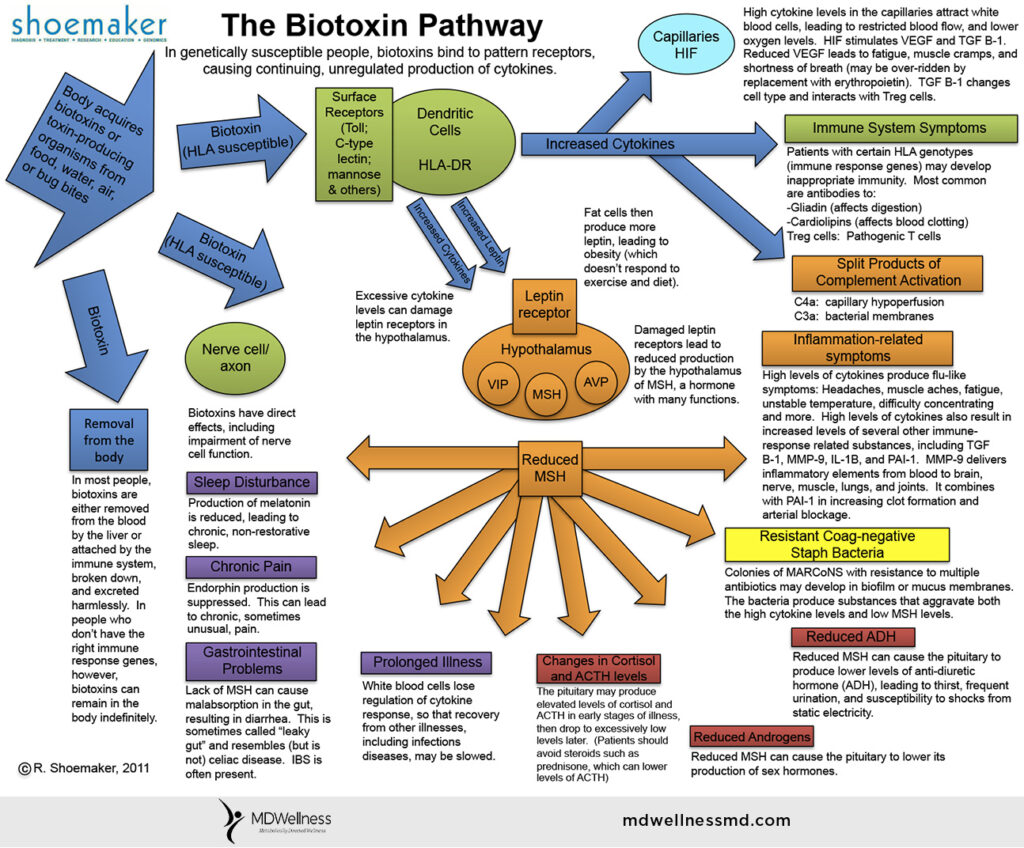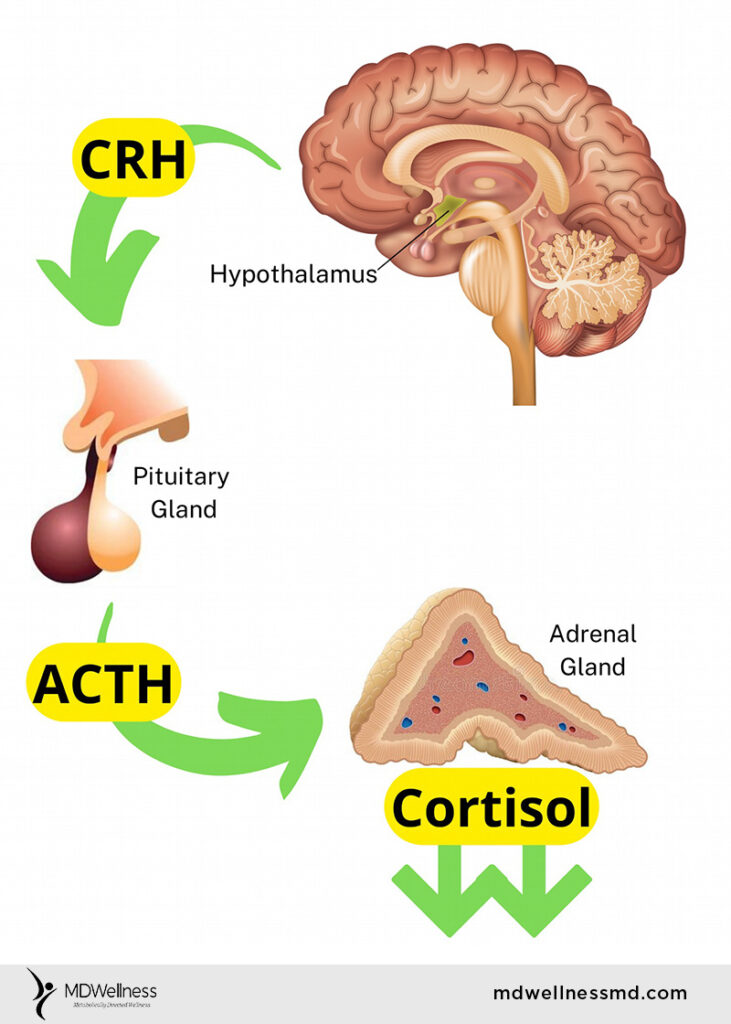Are you experiencing mysterious symptoms of CIRS that doctors can’t seem to explain? Do fatigue, brain fog, and unexplained body aches constantly plague you? These could be signs that you are suffering from Chronic Inflammatory Response Syndrome (CIRS). This debilitating condition, characterized by a range of symptoms of CIRS, often goes undiagnosed, leaving patients frustrated and desperate for answers

Embark on a journey of discovery with us as we reveal the hidden symptoms of CIRS, equipping you with the crucial knowledge to navigate this condition. Begin the transformative journey toward health—recognize the silent signs, embrace early detection, and seek accurate diagnosis. Take that vital first step with us and move towards a life free from the shadows of CIRS
Chronic Inflammatory Response Syndrome (CIRS) is a condition that occurs when the body’s immune system becomes overwhelmed and unable to regulate inflammation properly. It is often triggered by exposure to mold and other biotoxins, leading to a range of debilitating symptoms. The syndrome was first identified by Dr. Ritchie Shoemaker, who noticed a pattern of symptoms in patients exposed to water-damaged buildings.
CIRS is not a well-known condition, and many patients suffer for years without a proper diagnosis. The symptoms of CIRS can be diverse and vary from person to person, making it challenging to identify. However, by understanding the common symptoms associated with CIRS, individuals can seek the appropriate medical attention and treatment.
Mold exposure is a significant trigger for CIRS. When individuals are exposed to mold spores, their immune system can become dysregulated, leading to an inflammatory response. Mold produces biotoxins, which can have a detrimental effect on the body, especially in individuals who are genetically predisposed to an impaired detoxification system.
The presence of mycotoxins in the body can lead to chronic inflammation and a breakdown in various physiological processes. This can result in the development of CIRS and the subsequent onset of symptoms. It is essential to note that not everyone exposed to mold will develop CIRS. Genetic predisposition and individual susceptibility play a crucial role in determining who is at risk.
Proper diagnosis and testing for CIRS are vital to ensure that individuals receive the appropriate treatment and support. Since the symptoms of CIRS can overlap with other conditions, it is essential to consult with a healthcare professional experienced in diagnosing and treating this syndrome.
Several diagnostic tools can help identify CIRS, including a thorough medical history review, physical examination, and laboratory tests. These tests may include blood work to assess inflammatory markers, genetic testing to determine susceptibility, and urine tests to detect mycotoxins and other biotoxins.
While there is no cure for CIRS, certain lifestyle changes can help manage the symptoms and improve overall well-being. This includes adopting a clean and healthy diet, reducing exposure to environmental toxins, practicing stress management techniques, getting regular exercise, and optimizing sleep hygiene.
It is also essential for individuals with CIRS to prioritize self-care and engage in activities that promote relaxation and mental well-being. This may include mindfulness practices, yoga, meditation, and engaging in hobbies or activities that bring joy and fulfillment.
Early detection and intervention are critical when it comes to managing CIRS effectively. The longer the body is exposed to mold and biotoxins, the more challenging it becomes to restore balance and alleviate symptoms. Seeking medical attention at the first signs of possible mold exposure or unexplained symptoms can prevent years of unnecessary suffering.
It is essential for healthcare providers to consider CIRS as a potential diagnosis when evaluating patients with unexplained chronic symptoms. By raising awareness and educating medical professionals, more individuals can receive timely and accurate diagnoses, leading to improved treatment outcomes.
As our understanding of CIRS continues to evolve, so too does the research and advancements in diagnosing and treating this complex syndrome. Ongoing studies are focusing on identifying biomarkers, developing targeted therapies, and refining diagnostic criteria.
It is an exciting time for the CIRS community as new discoveries shed light on the underlying mechanisms of this condition. These advancements offer hope for improved diagnostic accuracy, more effective treatments, and ultimately, a better quality of life for individuals with CIRS.
The following are useful links for advanced CIRS testing:
For a quantitative AI generated analysis of relative brain volumes
Neuroquant testing https://www.cortechs.ai/products/neuroquant/
For a transcriptonic analysis of inflammatory patterns:
GENIE Testing https://www.progenedx.com/genie-surviving-mold
For testing visual contrast sensitivity
VCS testing https://www.survivingmold.com/store/online-vcs-screening
For screening of environmental conditions:
ERMI testing https://www.envirobiomics.com/product/ermi/?v=7516fd43adaa
While living with CIRS can be challenging, understanding the silent symptoms and underlying mechanisms of this condition can empower individuals to take control of their health. Through early detection, proper diagnosis, and personalized treatment plans, individuals with CIRS can find relief from their symptoms and improve their quality of life.
By raising awareness and advocating for improved diagnostic protocols, we can ensure that individuals with CIRS receive the support and understanding they deserve. Together, let us unmask the hidden symptoms of CIRS and forge a path towards a healthier and happier future. Take the first step towards reclaiming your life and finding relief from the silent torment of this often misunderstood condition
Many patients that suffer from chronic illnesses are actually unknowing victims of biotoxin illness. Scientific research and clinical experience has revealed that many patients suffering from diagnosed chronic diseases may have underlying immunologic responses related to biotoxin illness. In other words, if you have been diagnosed with multiple sclerosis, Parkinson’s disease, dementia, tremors, unexplained weight gain, depression, anxiety, irritable bowel syndrome, paroxysmal orthostatic tachycardia syndrome, Lyme disease, chronic fatigue syndrome, fibromyalgia, leaky gut syndrome, migraine headaches, premenstrual syndrome (PMS), polycystic ovary syndrome (PCOS), systemic candidiasis (yeast syndrome), multiple chemical sensitivities or other mysterious chronic ailments, you may actually be suffering from a form of biotoxin illness.
The treatment for CIRS requires an intelligent, systematic approach that includes the following:
Dr Rothman was introduced to the concept of mold illness and the work of Dr Ritchie Shoemaker in 2011 leading to therapeutic breakthroughs for helping these “problem” patients.
Dr. Michael Rothman is a leading expert in the diagnosis and treatment of CIRS.
Surviving Mold Protocol Certified by Dr. Ritchie Shoemaker
His approach is based on the following principles:
Dr. Ritchie Shoemaker’s Pioneering Work in Environmental Illness
Dr. Shoemaker has been the leading pioneer investigating mold (and other biotoxin related) illnesses since 1996. His brilliant work has paved the way for understanding the genetic and proteomic aspects of biotoxin illness. Dr Shoemaker has written numerous studies published in peer-reviewed journals supporting the scientific proof of his methods. After practicing medicine for over 30 years, Dr Shoemaker retired from his family medicine practice in Pokomoke, Maryland in 2013.However, he continues be in the forefront of research on biotoxin illness and is passing the torch to a new generation of doctors in The Surviving Mold Protocol. Dr Michael Rothman is the latest doctor honored by achieving The Shoemaker Certification for treating biotoxin patients.








A way to visualize biotoxin excretion with and without binding agents






Dr Rothman discusses the genetic and immunologic causes of mold related illnesses. He then reviews the diagnosis and treatment of these chronic, health destroying conditions known as chronic inflammatory response syndrome (CIRS), following the Surviving Mold Protocol.
To learn more about MD Wellness contact us today by giving us a call at (732) 268-7663, emailing us at [email protected] or by requesting an appointment online.
Disclaimer: The entire contents of this website are based upon the opinions and experiences of Dr. Rothman, unless otherwise noted. Individual articles are based upon the opinions of the respective author, who retains copyright as marked. The information provided on this website is not intended to replace a one-on-one relationship with a qualified health care professional and is not intended as medical advice. It is intended as a sharing of knowledge and information from the research and experience of Dr. Rothman and his community. Dr. Rothman encourages you to make your own health care decisions based upon your research and in partnership with a qualified health care professional. If you are pregnant, nursing, taking medication, or have a medical condition, consult your health care professional before using products based on this conte
© 2024 MD WELLNESS. All Rights Reserved. | Terms & Conditions | Our Disclaimer and Privacy Policy | Shipping & Return Policy
Website Created and Managed by M&A consulting
Schedule a Free Consult
Complete this quick form to schedule a
non-obligation 15 minutes phone consultation.